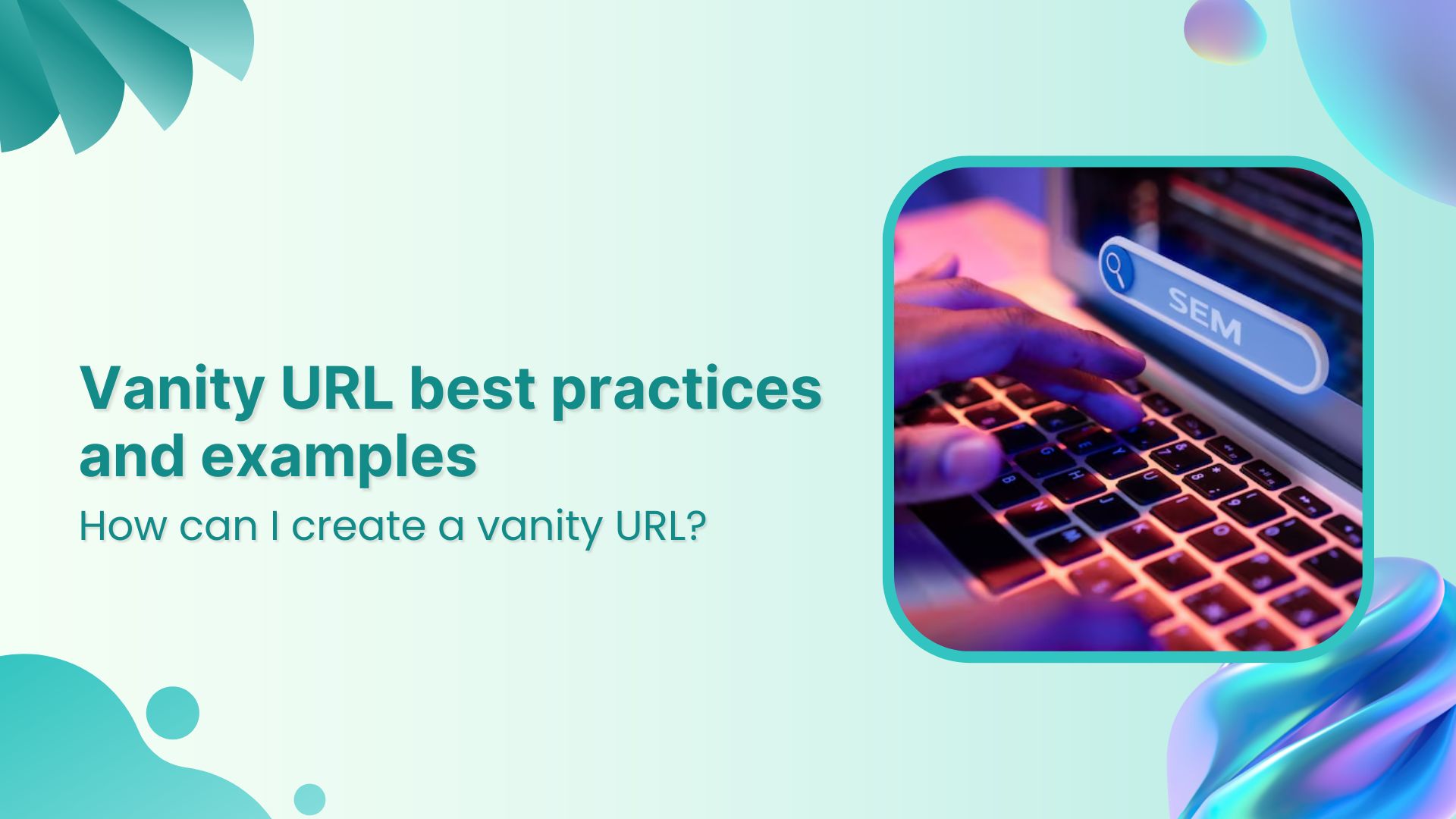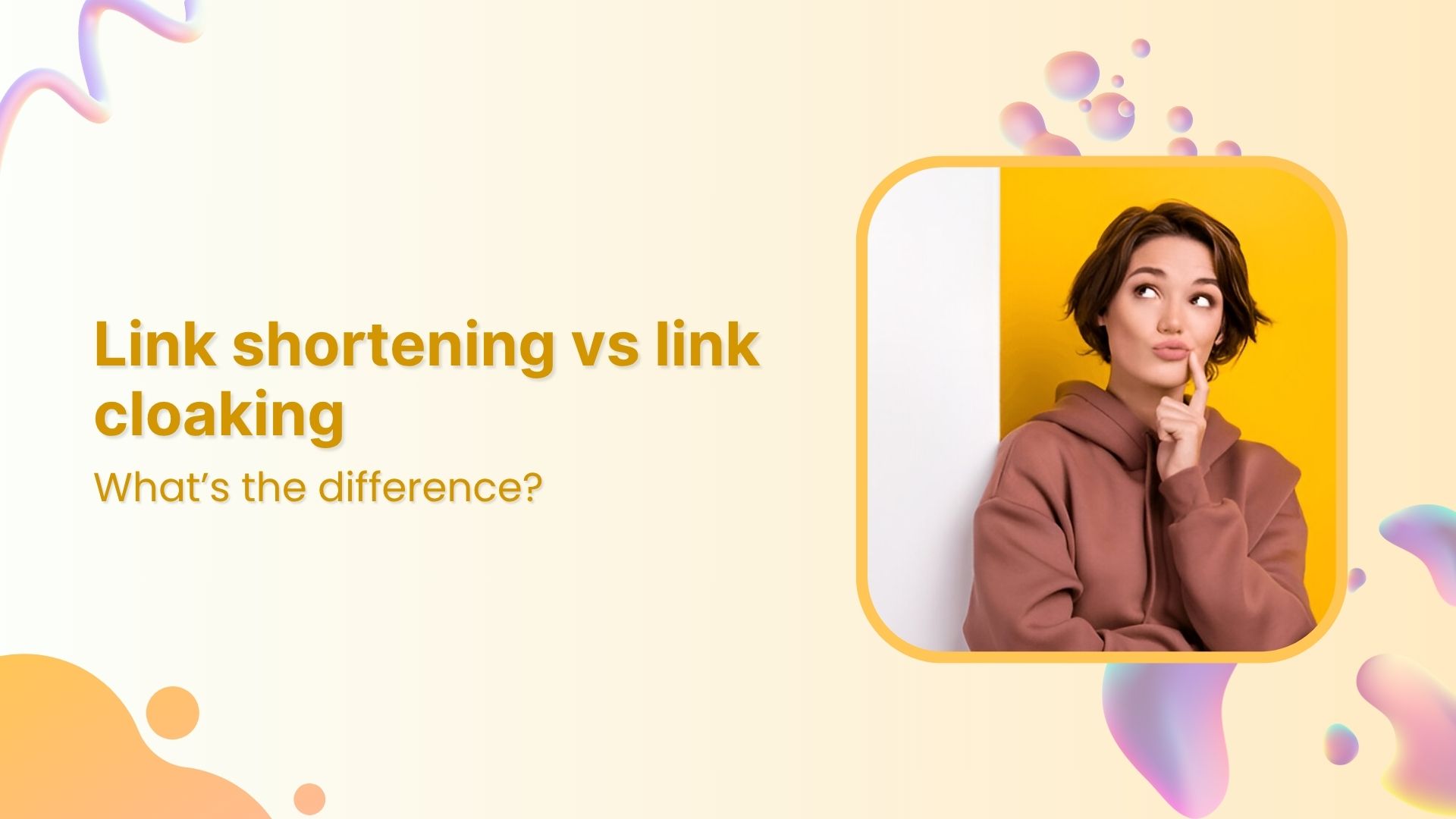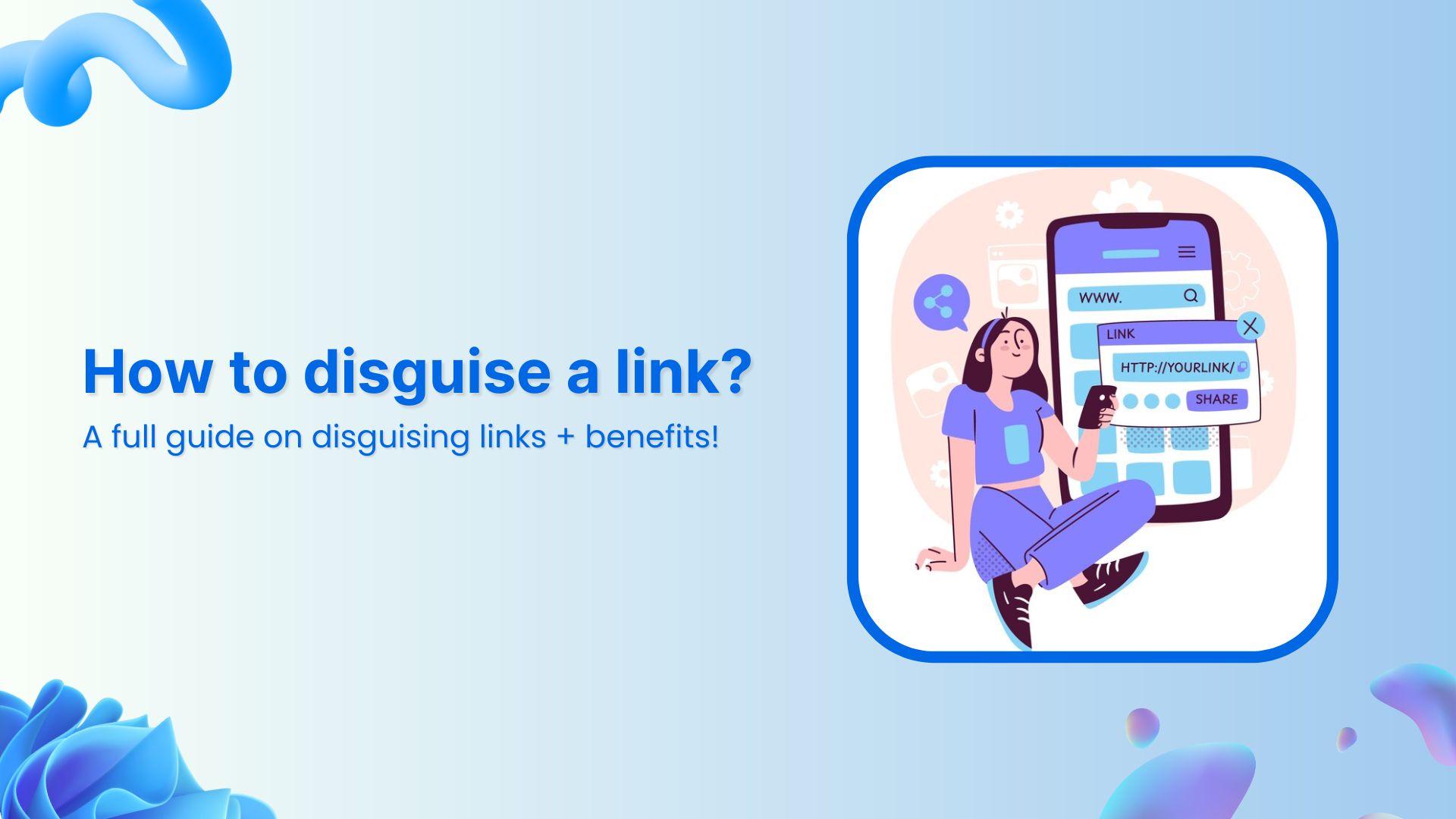Vanity URLs and non-vanity URLs are more than just a choice of characters. It’s a strategic decision that can define your content accessibility and appeal.
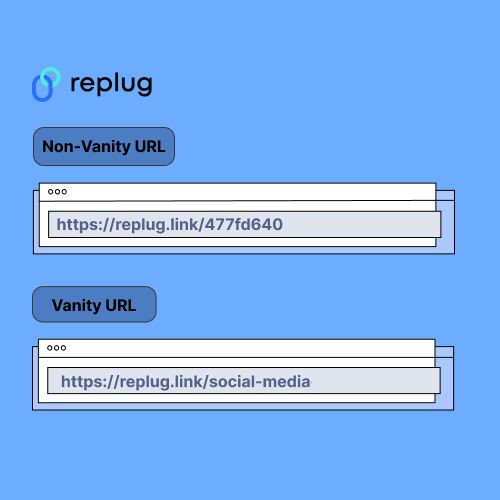
Considering the image above, which link would you prefer to click on?
Chances are, the second one, right? It’s clear, concise, and tells you exactly where you’re heading! This improves the click-through rate of your URL.
But here’s the thing: it’s not just about the clickability factor (although that’s definitely a big bonus). The real magic happens behind the scenes, where search engines are busy crawling and indexing web pages.
You see, the above vanity URL is not only user-friendly but also sends a clear signal to search engines about the page’s content.
On the flip side, the other URL might contain valuable content, but without any context in the URL itself, it’s like searching for a needle in a haystack. Who has the time for that?
But hey, don’t just take our word for it. Test it out for yourself and see the difference it makes. Who knows, you might be surprised at how a minor URL tweak can impact your brand’s performance!
For your help, we created this blog post, which shows some of the best vanity URL practices and benefits alongside examples to help you get started. Keep reading…
What is a vanity URL?
A vanity URL is a customized web address created to reflect a specific brand, product, or campaign.
Unlike generic URLs, which often contain a string of random characters, vanity URLs are carefully crafted to be memorable and align with the brand’s identity.
Difference between a generic short link and vanity URLs
Here’s a table differentiating a generic short link and a vanity URL:
| Generic short link | Vanity URL | |
| Composition | Random sequence of characters/numbers | Customized to reflect brand or keyword |
| Length | Shortened for simplicity | Can vary in length |
| Branding | Typically lacks branding | Reinforces brand identity |
| Memorability | Less memorable | More memorable and recognizable |
| Personalization | Limited to shortening URLs | Custom-created to align with brand |
| Purpose | Practical for sharing long URLs | Enhances brand visibility and recall |
| SEO Impact | Minimal impact on SEO | Can improve search engine visibility |
Shorten your links, amplify your brand.
Create shareable, trackable and fully customizable branded urls. Get more clicks with absolute link management features such as Bio Links, retargeting, deep Links, CTA’s and more.
Learn More!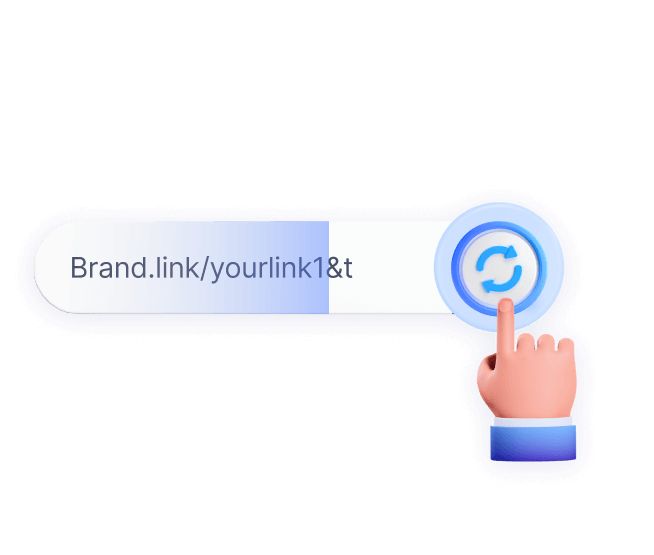
How can I create a vanity URL?
Consider using a link-shortening tool to make your links shorter and more manageable. We recommend trying out Replug because it’s easy to use and has many extra features that similar services might not have.
These features include managing your links efficiently, tracking how many people click on them, adding retargeting pixels, traffic routing, and more.
Here’s a quick breakdown of some of the steps in Replug to create vanity URLs for your link:
- Sign up for a Replug account
Head over to Replug’s website and create a free account if you don’t already have one.
Branded Short Links
Create and track branded short links for your business for better conversions.
Brand Your Links Now!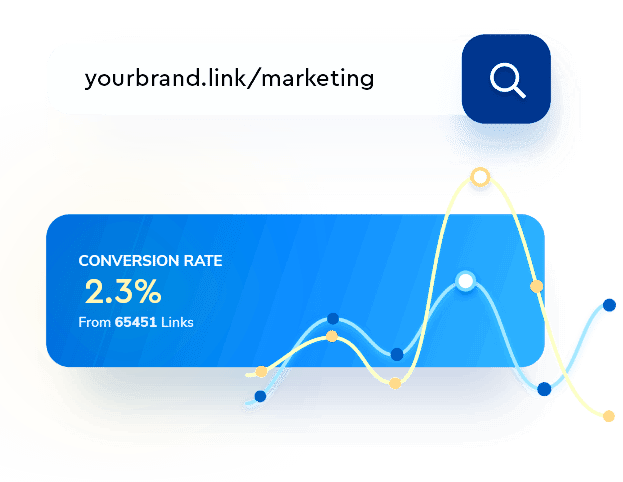
- Set up a custom domain
Before you start creating branded links, the first step is choosing a custom domain you’d like to use—if you haven’t already.
With Replug, you can connect your own domain to give your links a consistent, branded look. There are plenty of creative domain extensions to consider, such as:
- .link
- .xyz
- .studio
- .tv
- .live
For example, instead of using a generic shortener, you could go for something unique like promo.xyz, soundbyte.live, or watchnow.tv. It all depends on your brand and audience.
- Connect your custom domain
Once you’ve picked and registered your custom domain, you can easily add it to your Replug account and start generating vanity URLs that build trust and visibility:
- Navigate to Replug’s dashboard. Click on the gear icon (⚙️) on the top right corner > “Custom Domains“
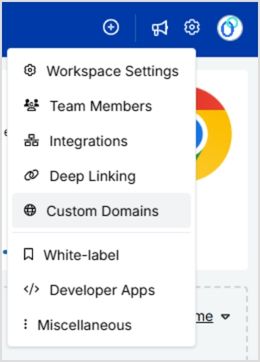
- Click on “Add Domain“
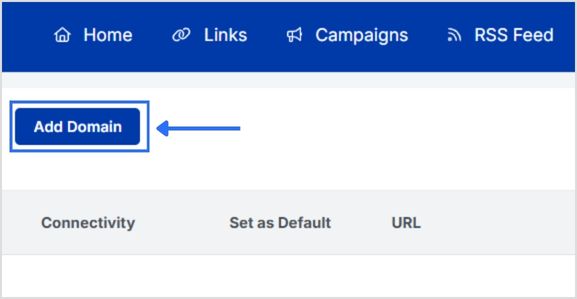
- Connect custom domain. Add your domain URL, 404 Redirect URL (if you don’t want users to land on a broken page), and your branded domain.
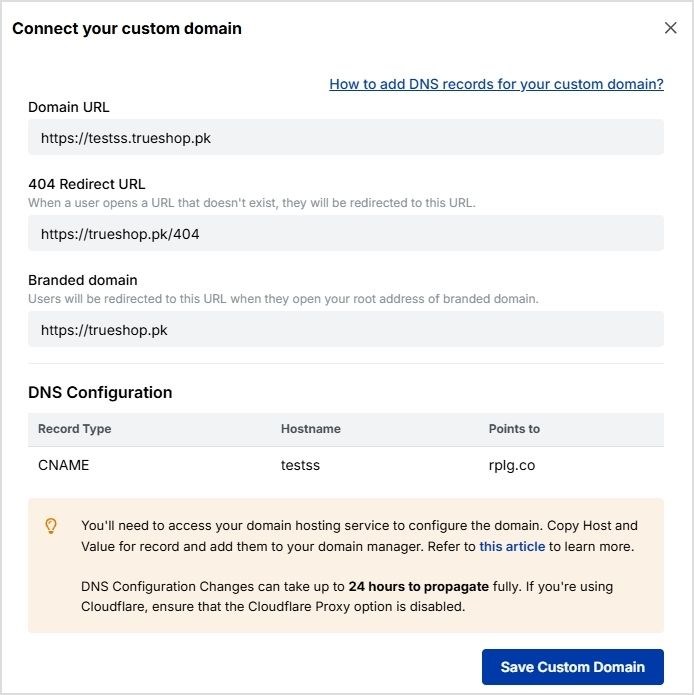
Don’t know how to configure DNS? Read this guide to learn how.
How to create a vanity URL in Replug?
Let’s move on to how to create a vanity URL in Replug. It’s simple and quick!
- Create new campaign
- Select Campaigns from the navigation bar
- Click “Create New”
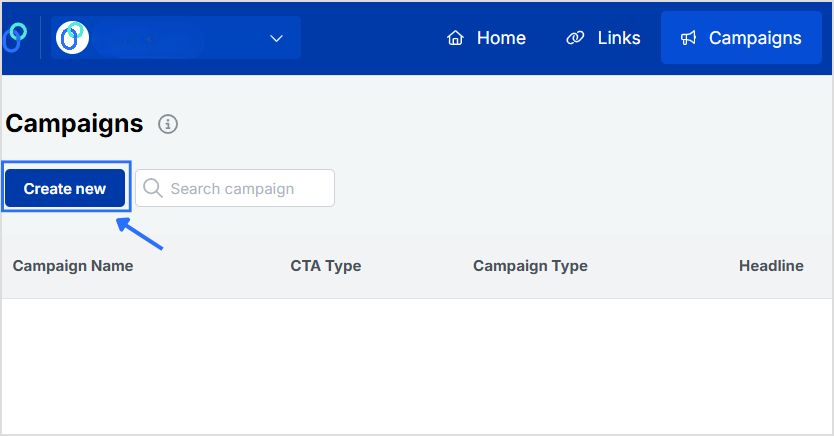
- Enter your campaign details and save. Type the relevant details in the given fields and save the campaign.
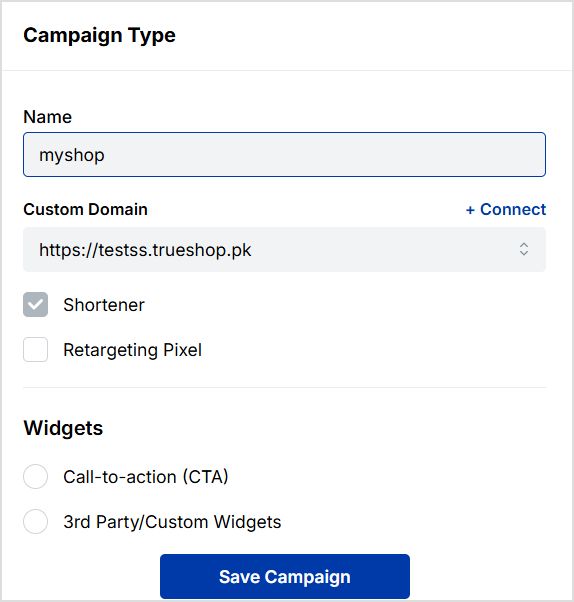
- Shorten your link
- Go to “Home” and enter your desired link in the bar under “Quickly Shorten your link”
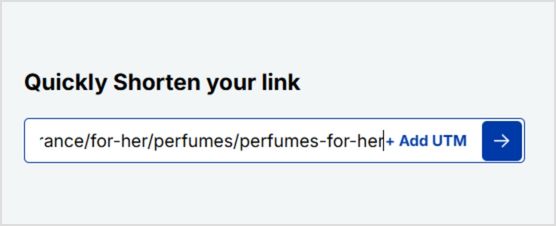
- Create your vanity URL. Select the campaign (in our example, “myshop”). Once done, Replug will generate a vanity URL automatically with your vanity domain at the backend of the URL. Replug might suggest a shortened URL, but you’ll have the option to customize it.
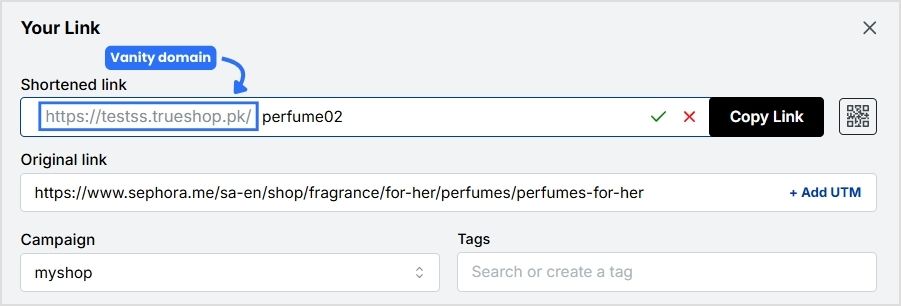
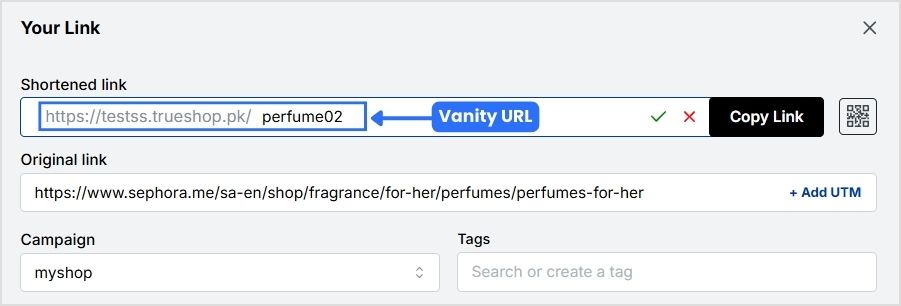
- Save your vanity URL. Click on “Save Shortened Link”. Your vanity URL is now ready to share across all platforms!
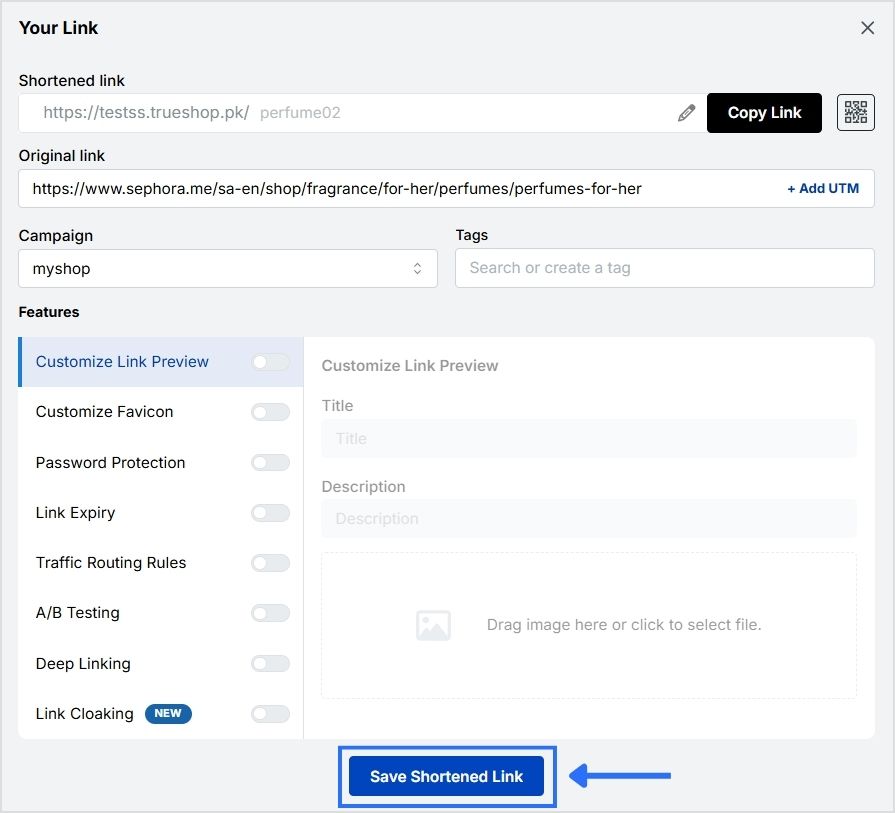
6 major benefits of using a vanity URL
Here are some of the major benefits of using a vanity URL.
- Improved user-experience
Easy-to-remember links lead to a frustration-free user experience. No more struggling to decipher cryptic shortened links or wondering where they might lead.
- Click-through rates get a boost
Memorable, vanity URLs grab attention and boost clicks by sparking curiosity and encouraging engagement.
- SEO advantage
Adding relevant keywords to your vanity URL can give your SEO a small but meaningful boost, as search engines factor in URL content when ranking pages.
Related: How to create an SEO-friendly URL: Ultimate tips
- Cross-channel promotion
Vanity URLs help create a brand identity across channels; social media, email, or print. They make your content easier to find and reinforce your brand, boosting reach and engagement.
- Integrating a link retargeting tool
Adding a retargeting pixel to your vanity URLs lets you build custom audiences and show targeted ads to users who clicked your links—keeping your brand in front of them as they browse the web.
- Track your URLs
Vanity URLs make it easy to track link performance and understand user behavior. With a tool like URL tracking tool, you can monitor clicks, conversions, and more to measure your campaign’s impact
5 best practices to create a vanity URL
| Best Practices | Description |
| Try to keep it short and sweet | Aim for 3-5 words for maximum memorability. Longwinded vanity URLs defeat the purpose and become cumbersome to share. |
| Clarity counts | Use keywords that accurately reflect the content the link leads to. Think about the search terms users might employ to find that specific information. |
| Brand it up | Incorporate your brand name or a relevant keyword to solidify brand recognition. This is a prime opportunity to embed your brand in the user’s mind with every share. |
| Simplicity is key | Avoid special characters and complicated spelling. Imagine someone hearing the URL out loud, not just reading it. Steer clear of anything that might confuse when spoken. |
| Consistency is king | Maintain a consistent format for all your vanity URLs. This builds brand identity and user trust. Having a recognizable pattern for your vanity URLs makes them even more memorable and reinforces your brand image. |
| Try not to add dashes or slashes | It’s best to avoid using dashes or slashes in your vanity URLs. While these characters might seem harmless, they can disrupt the flow and readability of the link. Instead, stick to using simple words separated by hyphens for clarity and ease of understanding. |
Let’s have a look at some of the examples of vanity URLs
Check out this custom vanity URL shared on Facebook by Treetop, a renowned juice brand in the USA. See how they crafted a URL specifically tailored to showcase the content of the link.
Another example comes from Instagram, where ContentStudio, a social media management tool, strategically placed a link in its bio next to its name. This simple yet effective approach ensures that visitors to their social media page immediately understand where they can find more information or engage further with the brand.
Conclusion
All in all, by crafting custom, keyword-rich vanity links that align with your brand identity and messaging, you can improve search engine visibility, enhance user engagement, and drive conversions.
FAQs on vanity URL best practices
What is a vanity URL?
A vanity URL is a customized web address that reflects a specific brand, keyword, or campaign.
Are vanity URLs safe?
Yes, vanity URLs are generally safe to use as long as they are from reputable sources and don’t redirect to harmful sites.
Can vanity URLs be tracked?
Yes, vanity URLs can be tracked to monitor clicks, engagement, and other metrics using tracking tools.
Can vanity URLs expire?
Yes, vanity URLs can expire, depending on the service provider or settings, but they can often be renewed or reactivated.
Are vanity URLs only beneficial for large corporations?
Not at all! Vanity URLs can benefit businesses of all sizes by improving branding, SEO, and user engagement.
How do I create a vanity URL?
One can utilize a URL shortening tool such as Replug to custom-create vanity URLs.
Can vanity URLs be changed after creation?
Yes, most vanity URL services allow users to edit or update their custom URLs as needed. However, it’s essential to maintain consistency to avoid confusion among users.
You may also like:
- How to Create a Facebook Vanity URL: 5 Simple Steps
- How to Get a YouTube Vanity URL: Quick Guide
- How to Create a LinkedIn Vanity URL?



























